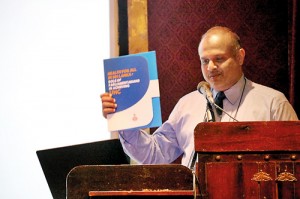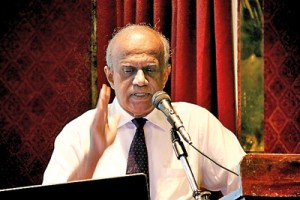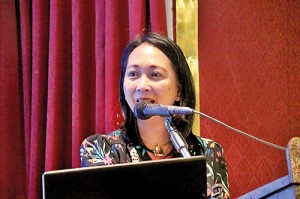News
UHC aims to give quality health for all
Three people reaching up for fruit on a tree. No, it is not the forbidden fruit but ‘fruit’ they have every right to access but only one is able to so, with the other two unable to savour them.

Health inequalities which Universal Health Coverage is striving to redress.
This was the striking slide that the Sri Lanka Medical Association (SLMA) President, Dr. Ruvaiz Haniffa, put up on the screen to grab the attention of the media on the need to promote Universal Health Coverage (UHC) on December 11, a day before International UHC Day which was December 12.
UHC is about ensuring that “all” people can get quality health services, where and when they need them, without suffering financial hardship, reiterated Dr. Haniffa as the other speakers had done before him.
He said that UHC will ensure that all three would have access to the ‘health’ fruits.
Referring to the three pillars of democracy which are the Executive, the Legislature and the Judiciary, he pointed out that the fourth pillar is the media and urged this vital group to help them to make the right of UHC available to everyone in Sri Lanka. It will ensure that all three people depicted in the sketch would have access to the ‘health’ fruits.
“In the past we have been treating illness and disease. This has only left us with a health system that is not people-centred. It is high time we changed that. We cannot continue business as usual. We must include everyone, everywhere,” Dr. Haniffa told a media briefing jointly organized by the SLMA, the World Health Organization (WHO) and the UNFPA (the United Nations Population Fund) on the theme ‘Unite for UHC – Now is the time for collective action’ at the SLMA auditorium.
Strongly echoing similar sentiments, WHO Sri Lanka’s Acting Country Representative Dr. Olivia Corazon Nieveras said that good health is a human right, not a privilege.
Health systems need to focus on promoting health and not just curing diseases. The goal should be for everyone to live well and not just to live more.
“We need to transform health systems from being hospital-centred and illness-based to people-centred systems. The first level of future healthcare should become increasingly closer to where people live and work. As our needs change across life-stages, access to health services should not,” she pointed out, adding that Sri Lanka is in a good trajectory towards UHC by investing in Primary Health Care (PHC) reorganization. PHC is the most effective and efficient way of achieving good health for the population.

Dr. Ruvaiz Haniffa

Dr. Palitha Abeykoon
Why do we need UHC, asked Dr. Nieveras, replying that health is a human right and people should not go bankrupt when seeking healthcare. People should not have to choose between healthcare and sustenance, while it is also a key-driver in achieving the Sustainable Development Goals (SGDs). “The key resource we have is ourselves and all countries can ensure UHC if there is political will.”
The “heart” of UHC is equity, WHO Sri Lanka’s National Programme Officer (Health Systems and Evidence) Dr. Padmal de Silva stressed, pointing out that there are pockets of inequities in Sri Lanka. The country has a rapidly-ageing population which will be 19% of the population by 2030; there are increasing cases of mental health problems among adolescents; 10% of the adult population is expected to have diabetes; and 1 of 3 females and 1 of 4 males are overweight.
There are many challenges and though the health system in Sri Lanka is good, there is an urgent need for it to evolve, he said, adding that UHC was all about inclusive health, where no one will be left behind.
Health expert Dr. Palitha Abeykoon, who is Chairman of the National Authority on Tobacco and Alcohol and Past President of the SLMA, said that the thinking on what health was – physical, mental and social wellbeing – had stood the test of time since 1948 and this is what should be ensured.

Dr. Olivia Corazon Nieveras
He echoed the current WHO Director-General Dr. Tedros Adhanom Ghebreyesus’s firm view that UHC is based on the conviction that health is a human right, not a privilege and that the good news is that UHC is achievable and also former DG Dr. Margaret Chan’s belief that UHC is one of the most powerful social equalizers among all policy options. It is the ultimate expression of fairness.
Why visit UHC in Sri Lanka, asked Dr. Abeykoon, answering that there is a need to look at some of today’s health needs and health coverage and who pays for it. “Some people who may be sick don’t seek healthcare, while some others don’t even know that they are ill (having high blood pressure or diabetes). This is the reality we want to improve,” he said, drawing an image of the ‘iceberg’ of health problems.
Talking of himself, he said that recently he went to a hospital at 3 a.m. and got a bypass done by 8 a.m., while a villager may have to be on a waiting list for six months.
What of quality and cost of health services available in the rural areas? What of out-of-pocket expenses on health?
Dr. Abeykoon compared the total health needs of people to a cube and explained that no country has been able to fill the cube. Nobody has got it totally right. The answer lies in giving to those not having and including more services. In Sri Lanka, out-of-pocket expenses amount to 45% and we need to reduce it to less than 25%.
According to him UHC has three dimensions:
- Who is covered? All including the poorest and most vulnerable.
- What services? The full range of essential health services which includes prevention, treatment and pain control.
- Who pays? The costs should be shared by the entire population and not only borne by those who are sick.
Meanwhile, UNFPA Assistant Representative in Sri Lanka, Madusha Dissanayake focused on the “unmet” needs of the youth and the elderly and the Health Ministry’s Dr. Shiromi Maduwage of the Directorate of Youth, Elderly and Disability dwelt on the current initiatives undertaken by the ministry with the youth and the elderly.

